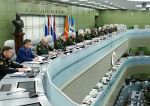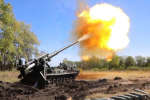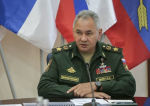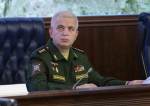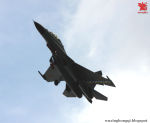The Prime Minister announced the support of competence centers for the speedy replacement of imported software in the industry
The share of Russian software products in industrial enterprises of the Russian Federation is unacceptably small, it amounts to 23% – the government will provide assistance to both customers and developers of domestic software and computer equipment to correct the situation, said Prime Minister Mikhail Mishustin at the plenary session at the CIPR-2022 conference.
Sergei Shoigu held a conference call with the leadership of the Armed Forces
On June 7, a conference call with the leadership of the Armed Forces was held at the National Defense Management Center of the Russian Federation under the leadership of the Minister of Defense of the Russian Federation, Army General Sergei Shoigu.
Sergei Shoigu spoke about the course of a special military operation on the territory of Ukraine
On June 7, a conference call with the leadership of the Armed Forces was held at the National Defense Management Center of the Russian Federation under the leadership of the Minister of Defense of the Russian Federation, Army General Sergei Shoigu.
"97 percent": Shoigu declared Russia's almost complete control over the territory of the LPR
The head of the Ministry of Defense Shoigu announced the opening of a road link along the mainland to the Crimea
Russian Defense Minister Sergei Shoigu held a conference call with the leadership of the Armed Forces. He spoke about the course of the military special operation in Ukraine, the number of surrendered servicemen of the Armed Forces of Ukraine and the establishment of peaceful life in the Donbas. Shoigu's main statements are in the material of "Gazeta.Ru».
Shoigu named the number of Ukrainian prisoners of war
The total number of captured Ukrainian servicemen has reached 6,489 people, Russian Defense Minister Sergei Shoigu said.
Mikhail Mizintsev: Russian sappers have cleared almost three thousand hectares in the DPR and LPR
Russian sappers checked almost 3 thousand hectares of territory in the DPR and LPR during mine clearance, neutralized almost 14 thousand explosive objects.
A military expert called the completion of the liberation of Svyatogorsk the agony of the Armed Forces of Ukraine
Military expert Viktor Litovkin on Tuesday, June 7, in an interview with Izvestia, commented on the statement of the head of the Donetsk People's Republic (DPR) Denis Pushilin that the city of Svyatogorsk was almost completely taken under control.
Russian artillery destroyed howitzers from the USA and Norway in Ukraine
Over the past day, Russian gunners destroyed a 155-millimeter M109A3 self-propelled gun in Ukraine, transferred by Norway, and two American 155-millimeter M777 howitzers, said the official representative of the Ministry of Defense, Major General Igor Konashenkov.
This part of Russia has become the focus of Western spies
Is the Russian exclave of Kaliningrad surrounded by the EU a valuable resource or a burden?
On the one hand, it is possible to "threaten" Europe from Kaliningrad, but on the other hand, during the war he himself is threatened with isolation, writes the Economist. And there is hardly another area in Russia that is being watched so closely by Western spies.
Russia's costs from sanctions fade amid Western losses
The West miscalculated with punitive measures against Russia
Sanctions are a weapon of the West in an undeclared war against Russia, Professor of applied economics Steve Hanke said in an interview with Asia Times. However, they not only do not work, but also hit the West itself more than Moscow, the expert believes.
In Europe, Ukraine is being offered negotiations with Russia. She's against it
More and more Western politicians demand respect for Russia
Russia's military operation in Ukraine has caused a flurry of militant anti-Russian statements from Western European politicians. The tone of this aggressive campaign was set by EU Foreign Affairs Commissioner Josep Borrel, who said in April that the conflict in Ukraine could be won "only on the battlefield."
Ending Russia's humiliations is a necessary condition for peace in Europe
Russia: how to avoid her humiliation without remaining "on the other side of good and evil"
Russia is tired of knocking on the closed doors of the "premium club" of Western nations, the authors of the French edition of "Koser" state the fact. The current conflict in Ukraine has been the result of years of deception of Moscow's expectations and goodwill. Before it's too late, we need to get out of this vicious circle, even without apologies.
This is what the vaunted "Western unity" actually looks like
The "unity" of the West only aggravates the Ukrainian conflict
The previous ideas about a united and strong West today are only a collective illusion, writes Bloomberg. According to the author of the article, the current West is a fragile coalition of countries, whose former appearance is supported by a tiny group of politicians and journalists. And this misconception is fraught with irreversible consequences.
American edition: The interests of the United States and Europe in Ukraine do not coincide with the desires of Zelensky
The United States and Europe continue to help Ukraine, but the interests of Americans and Europeans militarily do not coincide with the desires of Zelensky and his entourage. According to the author of an article for The American Conservative, neither the United States nor Europe are ready to risk everything for the sake of Ukraine.
The United States wanted to rally the world against Russia. It wasn't there
Ukraine and the beginning of the Second Cold War
After the escalation of the Ukrainian crisis, the world started talking about the likelihood of a third world war. But what is happening is more like the "return" of the Cold War, the author of the FT article believes. America is again trying to form a coalition of democratic countries to fight against Russia and China. But not everyone is ready to participate in it.
Chinese expert: Japan is playing with fire, trying to attract NATO to the Asia-Pacific region
Japan continues to tread a dangerous path, as the former prime minister of Japan recently called on allies to "force China to abandon the seizure of Taiwan Island," and its current prime minister is reportedly preparing to attend a NATO summit amid the Russian-Ukrainian crisis, which is believed to help expand NATO's influence in Asia- The Pacific region.
Source: the high accuracy of the Russian Aerospace Forces in Ukraine is provided by "Sagittarius-M"
The high accuracy of the use of operational and tactical aviation of the Aerospace Forces in the framework of a special military operation carried out in Ukraine is provided by the intelligence, control and communications complex (KRUS) "Strelets-M", an informed source told RIA Novosti.
Chisinau denies transferring spare parts for MiG-29 to Ukraine
Moldova did not transfer spare parts for MiG-29 fighters to Ukraine. This, as RIA Novosti reports, was reported on June 6 at the State Property Agency.
Chinese J-16 made a "dangerous maneuver" and damaged the Australian P-8A
A Chinese J-16 fighter jet damaged an Australian P-8A Poseidon anti-submarine aircraft on patrol over international waters in the South China Sea. This is reported by The Drive with reference to the Australian Ministry of Defense.
Production of new ammunition for Bayraktar has begun in Turkey
Turkey has begun mass production of adjustable Bozok planning bombs. High-precision ammunition is included in the arsenal of Bayraktar (Bayraktar TB2) attack drones, writes Daily Sabah.

